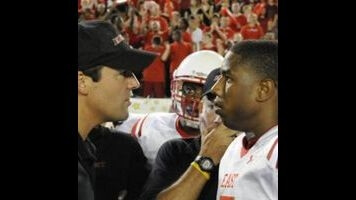Friday Night Lights: "Are You Ready For Friday Night?"

I don’t have much use for Tim Riggins, and tonight’s episode—which splintered off into three (count ‘em, three!) Riggins subplots—now gives me plenty of reasons to articulate why. A lot of it is casting: Taylor Kitsch certainly looks the part, but only in the sense that a male model might look the part. In other words, he gives you the poses of a hunky, smoldering, haunted young man, but rarely the three-dimensional, flesh-and-bone reality of it. (See also: Kitsch in The Covenant.) The writers have put him in plenty of combustible situations—the love triangle with his best friend Street and Lila; his anguished relationship with his brother and his fuck-up of a father; his time on and off the wagon—but there’s little life to Riggins’ character, and I think you have to blame Kitsch for that.
The other problem is the way Riggins has been conceived. He’s a sour, self-pitying drunk on the one hand, which is fine. But he’s also a hedonist who presumably enjoys tomcatting around town, getting all the tail he can out of those floppy bangs, sensitive eyes, and sculpted muscles. And it’s this latter part that never comes across—the pleasure and privilege of being a football star in a high school and a town that worships its heroes well out of proportion. Granted, I’m not asking him to be Smash, who makes the most of his status, but he’s a sour and boring drunk, and it’s a drag to see him wallow in it so often. Maybe he should team up with Landry again like last season, when he required tutoring services and turned up at the Crucifictorious gig. He can still have all the same problems; it just won’t feel like he’s sucking the air out of the room.
Case in point: The big development with Riggins tonight, outside of him collapsing of dehydration at a practice (an event that has more implications for the Eric/Buddy/McGregor subplot than Riggins, but I’ll get to later), was him reconnecting with born-again Lila, a.k.a. “the best I ever had.” His decision to take up Lila on her offer to go to church was complicated by a lot of interesting factors: Despair over his brother’s nascent romance with the MILF next door, renewed desire for Lila’s intimate company, and even a genuine need for spiritual connection, which is the sort of bottom-rung gesture that an alcoholic like himself might embrace. It’s all there in the writing, but where is it on the screen? I actually loved the scene at Lila’s mega-church, but less for Riggins’ confused presence than the wonderful, exacting ambience the show is so good at creating. (Most church scenes in movies and television come with an attitude, but there’s nothing judgmental about the way the scene is filmed. You get a feeling for the vibrancy of the place, and a non-condescending view of how people might be moved by it.) Later on, when Riggins tries to slip into Lila’s room after hours, Kitsch just doesn’t deliver like he needs to. When he tells her that being with her makes him feel closer to God, it sounds like a transparent come-on, but he’s half-sincere about it, too. A better actor might have brought that ambiguity across more effectively.
The fallout from the Saracen/Julie break-up manifested itself in several different ways, some compelling and others not so much. I like the conflict between Saracen and Smash—hey, Smash has something to do!—because it’s entirely about Saracen’s bruised feelings (from the break-up and the lack of confidence from the new coach) and Smash is utterly perplexed by it. He’s just being Smash, and he has little reason to apologize for the coach wanting to run the offense through him. Granted, he could show a little more team spirit and do the captain’s work of rallying the troops, but it’s his Senior year, too, and if he can carry to team to victory on his back, he’s happy to do so. I’m not sure the Saracen we know would instigate a brawl in open view after the game, even under his current duress, but he’s at his lowest point right now, so I’ll give him the benefit of the doubt.
Back home, as feared, things are getting spicy between Saracen and the Guatemalan maid Carlotta. When she treats him to the standard romantic wound-dressing and starts singing in his ear in native language, I couldn’t help but flash back to the scene in The 40-Year-Old Virgin when Steve Carell’s boss talks about her deflowering affair with the gardener and the beautiful Guatemalan love song he’d sing to her (which ended with the word “futbol,” if I recall). For her part, Julie continues to screw around with the Swede, hanging with his pot-smoking friends until 2 a.m. as they trade silly conspiracy theories. Then when she gets back home, she brazenly makes out with the Swede in the van, prompting Tami to wrestle her away by force.
Having Tami slap her daughter was the most bracing moment of the show, and sweet lord did Julie have it coming. Forget her giving Saracen the brush-off and staying out all night with an older guy; even without those offenses, she’s treated the arrival of her new sister like a four-year-old might and hasn’t shown an ounce of compassion to her mother in these tough times. It’s the height of teenage petulance—and hopefully as far as Julie will go—and I think the scene is powerful, but only to a point. When Julie screams, “You got rid of me when you had Gracie and Dad left,” I think the line puts way too fine a point on the conflict. It’s a clunky piece of writing.








































